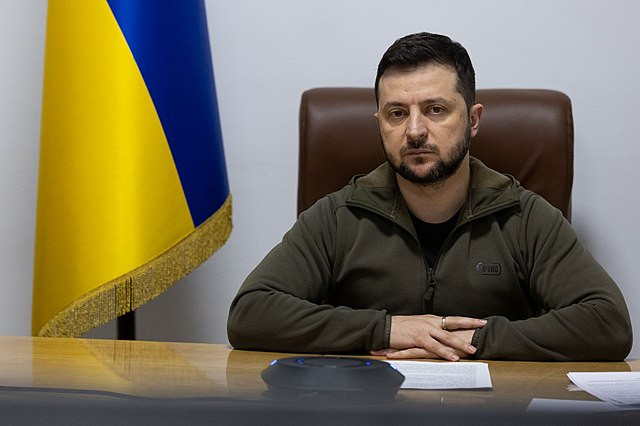President Volodymyr Zelensky of Ukraine has hit back at Russian accusations linking his country to the deadly attack on a Moscow concert hall, calling the claims "absurd" and suggesting that Russia is deflecting blame from the real threat of extremism within its borders. The attack, which left 137 people dead and 154 wounded, has been claimed by the Islamic State (IS) group, with new videos released by the terror organization corroborating their involvement.
In an address to the nation on Saturday, Russian President Vladimir Putin openly claimed that the men who attacked the Crocus City Hall had tried to flee to Ukraine, assisted by contacts there. However, Zelensky, visibly angry at the allegations, described the Russian leader and others in Moscow as "scum" for suggesting a connection between the attack and Kyiv.
"They burn our cities... they torture and rape," Zelensky said, referring to the actions of Russian troops in Ukraine since the full-scale invasion began in February 2022. He argued that instead of protecting Russia against the real threat of extremism, these troops were now brutalizing Ukraine.
Ukrainian military intelligence called the specific Russian claim that the gunmen were caught trying to flee across the Ukrainian border "absurd," noting that the active front line is teeming with Russian soldiers and security services. Andriy Yusov, a spokesperson for the directorate, argued that anyone attempting to head there after staging a major attack on Moscow would be either "suicidal" or "stupid."
Videos circulating on social media show the detention and interrogation of the suspected attackers, with one clip depicting a Russian agent trying to force a man to eat a piece of his own severed ear. The release of these videos, presumably meant to showcase a tough response, follows an attack that the same security services failed to prevent or anticipate, despite receiving intelligence from the United States earlier this month.
IS has released new videos of the attack, filmed on body cameras and featuring shouts of "God is Greatest" from the attackers as they hunted concertgoers through the lobby of the Crocus City Hall, firing at them from pointblank range. The terror group's claim of responsibility has been largely ignored by Russian officials and state media, with some, like prominent state television host Olga Skabeyeva, suggesting that Ukrainian military intelligence had recruited assailants "who would look like Isis."
The United States has confirmed that it received intelligence indicating IS acted alone in the attack. "Isis bears sole responsibility for this attack. There was no Ukrainian involvement whatsoever," stated Adrienne Watson, the National Security Council spokesperson.
Fresh details have emerged about how the gunmen stormed the concert hall, setting fires by an emergency stairwell to herd people toward a killing zone in the lobby. The men were caught in the southern Bryansk region, where authorities said they disabled their vehicle and apprehended several suspects as they fled into a nearby forest.
Some of the interrogation videos suggest that the men were tortured by Russian security forces, with one clip showing an officer wearing patches indicating support for neo-Nazi groups and contact with the far-right Rusich paramilitary group active in Ukraine.
As Russia observes a nationwide day of mourning for the worst terror attack on its soil in two decades, Zelensky has suggested that Russians ask questions of their own intelligence agencies rather than blaming Ukraine. He alluded to a dark theory raised by his military intelligence agency, suggesting that Russian authorities themselves may be linked to the attack to bolster Putin's hold on power and rally support for the war and further mobilization.
The attack on the Crocus City Hall underscores the significant danger Russia faces within its borders, rather than the fabricated threat from Ukraine used to justify Putin's 2022 invasion. As the Russian president grapples with this reality, the world watches to see how the situation unfolds and whether the evidence pointing to IS involvement will be acknowledged or further obscured by accusations against Ukraine.
BBC and The Guardian contributed to this report.




